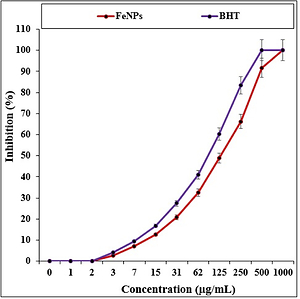Current issue
Archive
Manuscripts accepted
About the Journal
Editorial office
Editorial board
Section Editors
Abstracting and indexing
Subscription
Contact
Ethical standards and procedures
Most read articles
Instructions for authors
Article Processing Charge (APC)
Regulations of paying article processing charge (APC)
ONCOLOGY / EXPERIMENTAL RESEARCH
Iron nanoparticles green-formulated by Coriandrum sativum leaf aqueous extract: investigation of its anti-liver-cancer effects
1
Department of General Practice, Baoding No. 1 Central Hospital, Baoding City, Hebei Province, China
2
Department of Gastroenterology, Baoding No. 1 Central Hospital, Baoding City, Hebei Province, China
Submission date: 2021-08-30
Final revision date: 2021-11-23
Acceptance date: 2021-12-07
Online publication date: 2021-12-14
Corresponding author
Jing Han
Department of Gastroenterology, Baoding No.1 Hospital, No.320, Great Wall North Street, Baoding City, Hebei Province, China , China
Department of Gastroenterology, Baoding No.1 Hospital, No.320, Great Wall North Street, Baoding City, Hebei Province, China , China
KEYWORDS
TOPICS
ABSTRACT
Introduction:
An eco-friendly biosynthesized FeNP immobilized Coriandrum sativum extract has been introduced.
Material and methods:
The as-prepared nanoparticles (FeNPs) were characterized using UV-Vis, SEM, and FT-IR. It was shown that the iron nanoparticles have spherical shape and uniform size.
Results:
The synthesized nanoparticles have very low cell viability and high anti-liver cancer activities dose-dependently against pleomorphic hepatocellular carcinoma (SNU-387), hepatic ductal carcinoma (LMH/2A), Morris hepatoma (McA-RH7777), and Novikoff hepatoma (N1-S1 Fudr) cell lines without any cytotoxicity on the normal cell line (HUVEC). The synthesized nanoparticles inhibited half of the DPPH molecules in the concentration of 132 µg/ml. Perhaps notable anti-liver cancer activities of the synthesized nanoparticles against common liver cancer cell lines are linked to their antioxidant activities.
Conclusions:
Our results show that the FeNPs from Coriandrum sativum extract are apposite stabilizing agents, which serve as an effective anticancer agent against liver cancer cell lines.
An eco-friendly biosynthesized FeNP immobilized Coriandrum sativum extract has been introduced.
Material and methods:
The as-prepared nanoparticles (FeNPs) were characterized using UV-Vis, SEM, and FT-IR. It was shown that the iron nanoparticles have spherical shape and uniform size.
Results:
The synthesized nanoparticles have very low cell viability and high anti-liver cancer activities dose-dependently against pleomorphic hepatocellular carcinoma (SNU-387), hepatic ductal carcinoma (LMH/2A), Morris hepatoma (McA-RH7777), and Novikoff hepatoma (N1-S1 Fudr) cell lines without any cytotoxicity on the normal cell line (HUVEC). The synthesized nanoparticles inhibited half of the DPPH molecules in the concentration of 132 µg/ml. Perhaps notable anti-liver cancer activities of the synthesized nanoparticles against common liver cancer cell lines are linked to their antioxidant activities.
Conclusions:
Our results show that the FeNPs from Coriandrum sativum extract are apposite stabilizing agents, which serve as an effective anticancer agent against liver cancer cell lines.
Share
RELATED ARTICLE
We process personal data collected when visiting the website. The function of obtaining information about users and their behavior is carried out by voluntarily entered information in forms and saving cookies in end devices. Data, including cookies, are used to provide services, improve the user experience and to analyze the traffic in accordance with the Privacy policy. Data are also collected and processed by Google Analytics tool (more).
You can change cookies settings in your browser. Restricted use of cookies in the browser configuration may affect some functionalities of the website.
You can change cookies settings in your browser. Restricted use of cookies in the browser configuration may affect some functionalities of the website.



